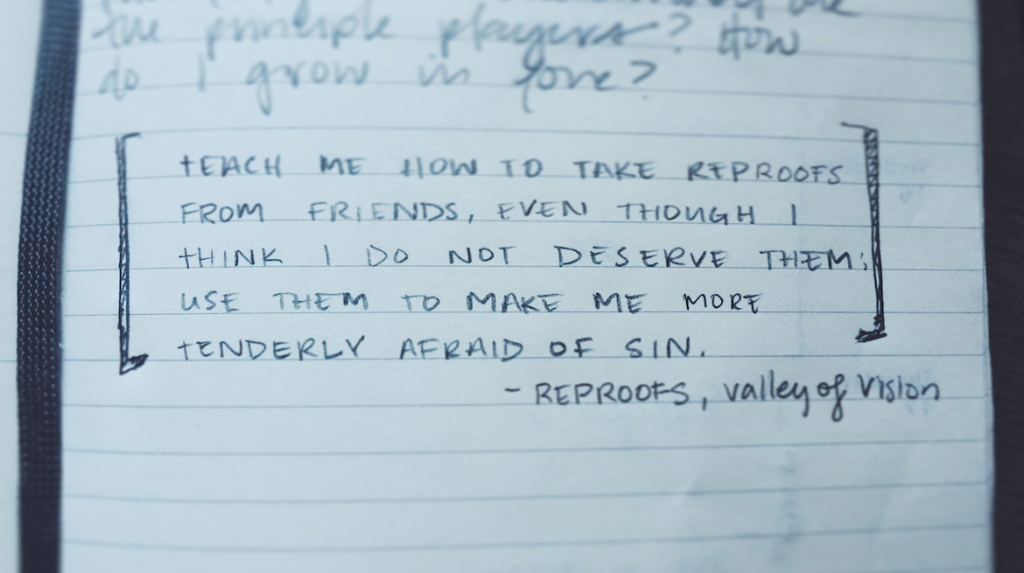Three Sinful Things to Say in Conflict
It is the work of providence, I suppose, that I have been reading about conflict in the church at Philippi these last few weeks and Nate is reading The Peacemaker. I somehow always imagined marriage to be ripe with conflict, but the truth is that ours hasn't been, or if it has, we're delightfully oblivious (that is not to say we have not had conflict, just that we do not stink of it every day). But for all the lack of conflict within our marriage, our entire relationship has been surrounded by conflict among those we love. Which, if you know either of us, is a grand cosmic joke between the Trinity: "Let's put these two passive, peace-loving, conflict-adverse people together for the rest of all time, okay?!"
"Yeah! And let's put them in ministry where they'll be surrounded by conflict all the time!"
"Grand idea!"
It was an exclamation mark fest, I just know it.
For all our natural passivity, though, the conflict swirling around us has been a blessing of sorts. Oh, we don't like it, don't mishear me, but it has been a "severe mercy." Through it we see God's mercy, our sinfulness, and the persistent unfinishedness of the Church—so in this, it has been a blessing.
One thing I am consistently surprised about, though, is the pervasiveness of modern psychology in the midst of conflict between Christians. Phrases like, "You've broken my trust in you/him/her/it," "I was wrong, but...," and "You shouldn't have waited until I'd sinned five times in this way before coming to me." It makes me wonder, truly, how broken is our theology if these are the words coming out of our mouths?
You've broken my trust. One of the best men I know is a biblical counselor across the street from my Texas church family. He told me once, "The bible never says we ought to have faith in another person, it only says we should place it in God." To displace my faith from another person is actually a good thing—it points me toward a God who cannot and will not fail. When our "trust has been broken" in another human, be encouraged, it was never meant to rest on them. Trust God.
I'm sorry, but... The most beautiful thing about repentance is there is no "but..." after the brokenness. To add a "but you..." or "but they..." after our admission of guilt (no matter how justified we may feel in our counter-accusation), takes away the weight we're meant to feel in our mourning over sin and the staggering beauty of a God before whom we stand fully approved and full loved as his children. One of my favorite passages on our response to sin is when Paul says to the Corinthians, "Ought you not rather mourn?!" So often we apologize and run quickly to a counter attack or run quickly to a false sense of security. Brothers and sisters, there is no security in coming out on top. Do not consider equality as something to be grasped, become obedient to death. He raises to life.
You should have told me sooner. There are two sorts of people in conflict that I'm observing: the first tends toward quick righteousness and the second tends toward prolonged grace. In the midst of conflict, the latter typically will overlook a matter (to God's glory) four, five, six times before finally coming to the brothers or sister and entreating them to righteousness. The former who desires quick righteousness typically responds, "Why didn't you come to me sooner!?" and so excuses their sin. Friends, overlook a matter, as much as it depends on you, extend grace, pursue peace, forgive seventy times seven without saying a word. The modern concept is that if we bottle up our feelings we're somehow doing ourselves a disservice and betraying our hearts. I have good news for you: God holds every one of your tears in his capable hands, He knows them and cares for them and has paid for every one of your sins—even the ones five times back. When you cover a multitude of sins with the love of God, you are not doing a disservice to yourself or to the accused. It is kindness that draws us to the throne and love that keeps us there.
Make no mistake, Christian, our theology is on display in the midst of conflict. Our belief in the gospel and its permeation in our lives comes through in those confrontations, apologies, stalemates, and arguments. God, the ultimate reconciler, though, has given us clear directives for the ministry of reconciliation. Conflict does not surprise or bewilder Him, He has made a way and set an ultimate example of humility, obedience, and persistence through His Son. Trust Him. Believe Him. We will always be disappointed by people but never by Christ.

